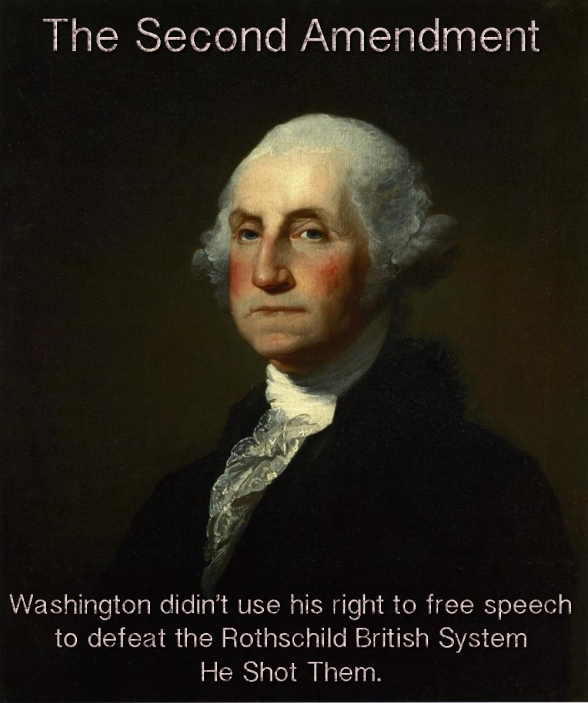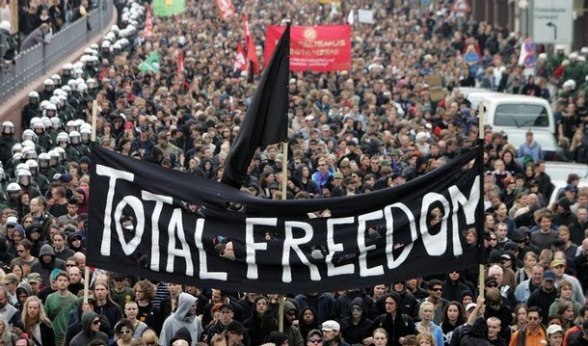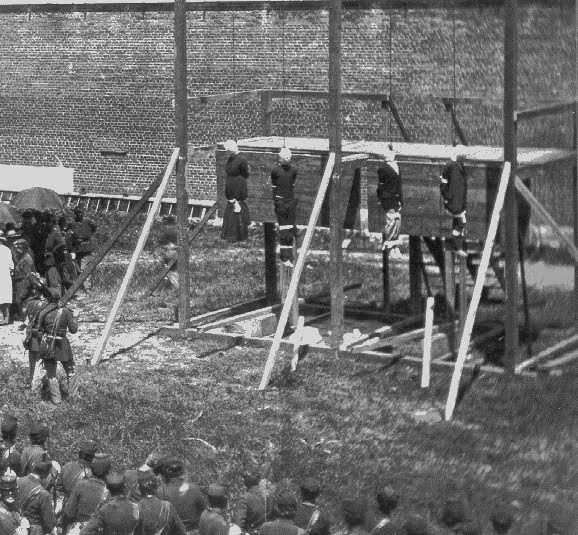Our Loving Obama Fights In Court Again For McCain’s Unconstitutional NDAA Detention & Incarceration Of U.S. Citizens Without Trial.
HANGING TRAITORS DURING THE CIVIL WAR & THEY RECEIVED A TRIAL.
The Obama [Banker's] administration is pulling out all the stops in its defense of a provision in a federal law that critics say allows the unrestricted detention of Americans should Washington decide the citizens are in “support” of any terror group or activity.
This from a government that previously has called those who support third-party presidential candidates, the Second Amendment or pro-life positions possible domestic terrorists.
The notice states the Obama administration is appealing the preliminary injunction as well as an order from the judge that the injunction bars the enforcement of the provision against anyone. Further, the Obama administration is upset that the judge denied its motion for reconsideration.
At the same time, Obama administration officials have filed a memorandum with the U.S. District Court where Judge Katherine B. Forrest issued the injunction because of the possible injury to citizens, including the loss of their rights.
Her ruling came after Justice Department officials refused to affirm that the journalists and others who brought the lawsuit would not be subject to detention for their work.
Their response in the newest filing was that the plaintiffs are protected. But the affirmation was conditional.
“As a matter of law, individuals who engage in the independent journalistic activists or independent public advocacy described in plaintiffs’ affidavits and testimony, without more, are not subject to law of war detention as affirmed by section 1021(a)-(c), solely on the basis of such conduct.”
They went further, but also made it conditional.
“Put simply, plaintiffs’ descriptions in this litigation of their activities, if accurate, do not implicate the military detention authority affirmed in section 1021.”
A brief filed by the case’s plaintiffs also pointed out the number of references to “independent” in the government’s statement.
“As the italicized qualifiers, and similar qualifiers elsewhere in the May 25 filing show, this standard is no safe harbor. It does not provide the assurance the court sought. It is a vague gloss on a vague statute; its vagueness and reach merely reinforce the plaintiffs’ standing,” said the document from David H. Remes of Appeal for Justice and his co-workers on the project.
Obama stated it first when he wrote in the accompanying signing statement when he put his signature to the legislative plan stipulating “my administration will not authorize the indefinite military detention without trial of American citizens.”
But government officials said the mere “speculation” that a future president may “reverse the current policy and apply section 1021 against U.S. citizens is insufficient to show an injury in fact,” meaning the plaintiffs shouldn’t be allowed to continue their case.
The case was brought before Forrest’s court because the law includes a vague provision that appears to allow for the suspension of civil rights and the detention of citizens linked to terrorism.
Virginia already has passed a law that states it will not cooperate with such detentions, and several local jurisdictions have done the same. Arizona, Rhode Island, Maryland, Oklahoma, Tennessee and Washington also have considered similar legislation.
The case was brought on behalf of Christopher Hedges, Daniel Ellsberg, Jennifer Bolen, Noam Chomsky, Alex O’Brien, Kai Warg All, Brigitta Jonsottir and the group U.S. Day of Rage. Many of the plaintiffs are authors or reporters who stated that the threat of indefinite detention by the U.S. military already had altered their activities.
Constitutional expert Herb Titus filed a friend-of-the-court brief on behalf of the sponsor of the Virginia law, Delegate Bob Marshall and others.
Titus, an attorney with William J. Olson, P.C., told WND the judge’s decision to grant a preliminary injunction halting enforcement of paragraph 1021 “affirms the constitutional position taken by Delegate Marshall is correct.”
The impact is that “the statute does not have sufficient constitutional guidelines to govern the discretion of the president in making a decision whether to hold someone in indefinite military detention,” Titus said.
The judge noted that the law doesn’t have a requirement that there be any knowledge that an act is prohibited before a detention. The judge also said the law is vague, and she appeared to be disturbed that the administration lawyers refused to answer her questions.
Titus said the opinion underscores “the arrogance of the current regime, in that they will not answer questions that they ought to answer to a judge because they don’t think they have to.”
The judge explained that the plaintiffs alleged paragraph 1021 is “constitutionally infirm, violating both their free speech and associational rights guaranteed by the 1st Amendment as well due process rights guaranteed by the 5th Amendment.”
She noted the government “did not call any witnesses, submit any documentary evidence or file any declarations.”
“It must be said that it would have been a rather simple matter for the government to have stated that as to these plaintiffs and the conduct as to which they would testify, that [paragraph] 1021 did not and would not apply, if indeed it did or would not,” she wrote.
Instead, the administration only responded with, “I’m not authorized to make specific representations regarding specific people.”
“The court’s attempt to avoid having to deal with the constitutional aspects of the challenge was by providing the government with prompt notice in the form of declarations and depositions of the … conduct in which plaintiffs are involved and which they claim places them in fear of military detention,” she wrote.
“To put it bluntly, to eliminate these plaintiffs’ standing simply by representing that their conduct does not fall within the scope of 1021 would have been simple. The government chose not to do so – thereby ensuring standing and requiring this court to reach the merits of the instant motion.
“Plaintiffs have stated a more than plausible claim that the statute inappropriately encroaches on their rights under the 1st Amendment,” she wrote.
Forrest found that the plaintiffs had a reasonable fear of detention based on the language of the statute. She ordered the provision not to be enforced until further proceedings in her court or “remedial” action by Congress that would restore those protections. She later clarified, pointedly, to the government that the injunction was for enforcement of the provision at all, not just against the named plaintiffs.
The brief was filed on behalf of Marshall and other individuals and organizations, including the United States Justice Foundation, Downsize DC Foundation, Institute on the Constitution, Gun Owners of America, Western Center for Journalism, the Tenth Amendment Center and Pastor Chuck Baldwin.
“The government was given a number of opportunities at the hearing and in its briefs to state unambiguously that the type of expressive and associational activities engaged in by plaintiffs – or others – are not within [paragraph] 1021. It did not. This court therefore must credit the chilling impact on 1st Amendment rights as reasonable – and real,” Forrest said.
Marshall’s HB1160 passed the Virginia House of Delegates by a vote of 87-7 and the Virginia Senate 36-1. Since the vote was on changes recommended by Gov. Bob McDonnell, it was scheduled to take effect without further vote.
Marshall then wrote leaders in state legislatures around the country suggesting similar votes in their states.
Marshall’s letter noted Virginia was the first state in the nation to refuse cooperation “with federal authorities who, acting under the authority of section 1021 of the National Defense Authorization Act of 2012 (NDAA), could arrest and detain American citizens suspected of aiding terrorists without probable cause, without the right to know the charges against them, and without the procedural rights guaranteed by the Bill of Rights.”
He told lawmakers, “While we would hope that the U.S. Senate and U.S. House of Representatives would be vigilant to protect the constitutional rights of American citizens, even when addressing the problem of international terrorism, those efforts in Congress failed at the end of last year, and President Obama signed NDAA into law on December 31, 2011.”
Endorsing Marshall’s plan was the Japanese American Citizens League, which cited the detention of tens of thousands of Japanese Americans during World War II on no authorization other than the president’s signature.
The Obama administration is arguing that the law indicates that those whose detention could be accomplished without legal due process would be those who “substantially supported” terror groups such as al-Qaida or “associated forces.” But the plaintiffs note that the law does not define those terms.
Instead, they point to the law’s provision that such individuals may be detained “without trial until the end of the hostilities.”
Obama attorneys said the new law simply “affirms” what already was precedent under the Authorization for Use of Military Force, which was adopted in the dust of the 9/11 terror attacks.

But plaintiffs wrote, “Nowhere does the AUMF convey to the executive the power to detain any person – citizen or otherwise – who ‘substantially supported’ al-Qaida or the Taliban or their associate forces, as section 1021 of the NDAA now provides.”
“No case has ever recognized the government’s contention that the AUMF authorized the detention of noncombatants … Neither case law nor the actual text of the AUMF supports the government’s contention that such detention power already existed.”
During arguments over the injunction, the federal government refused to submit witnesses, testimony or evidence and said its plan would remain the same should a trial be held on the issue.
Obama attorneys wrote that the plaintiffs “cannot point to a single example of the military’s detaining anyone for engaging in conduct even remotely similar to the type of expressive activities they allege could lead to detention.”
But the plaintiffs say there is a clear problem.
“The government’s new standard establishes that section 1021 is directed at or embraces speech and expressive conduct. That the government now reserves for itself the right to determine whether speech is independent journalistic activity or ‘independent’ public advocacy demonstrates the fundamentally expressive nature of the activities subject to the NDAA,” they wrote.
The Obama administration previously has release several reports that identify as possible domestic terrorists those who oppose abortion, advocate for the Second Amendment, think Washington has become too powerful or are returning veterans.
——————————————
WND
Liberty News Online
Related articles












